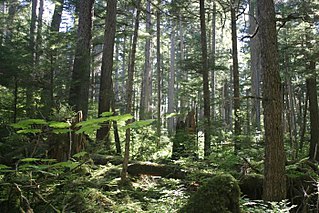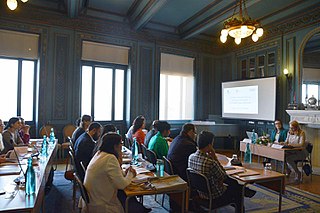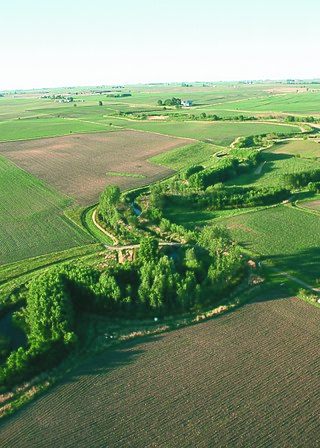
The University of Vermont (UVM), officially titled as University of Vermont and State Agricultural College, is a public land-grant research university in Burlington, Vermont. Founded in 1791, the university is the oldest in Vermont and the fifth-oldest in New England, making it among the oldest in the United States. It is one of the original eight Public Ivies.
Adaptive management, also known as adaptive resource management or adaptive environmental assessment and management, is a structured, iterative process of robust decision making in the face of uncertainty, with an aim to reducing uncertainty over time via system monitoring. In this way, decision making simultaneously meets one or more resource management objectives and, either passively or actively, accrues information needed to improve future management. Adaptive management is a tool which should be used not only to change a system, but also to learn about the system. Because adaptive management is based on a learning process, it improves long-run management outcomes. The challenge in using the adaptive management approach lies in finding the correct balance between gaining knowledge to improve management in the future and achieving the best short-term outcome based on current knowledge. This approach has more recently been employed in implementing international development programs.

Environmental resource management or environmental management is the management of the interaction and impact of human societies on the environment. It is not, as the phrase might suggest, the management of the environment itself. Environmental resources management aims to ensure that ecosystem services are protected and maintained for future human generations, and also maintain ecosystem integrity through considering ethical, economic, and scientific (ecological) variables. Environmental resource management tries to identify factors between meeting needs and protecting resources. It is thus linked to environmental protection, resource management, sustainability, integrated landscape management, natural resource management, fisheries management, forest management, wildlife management, environmental management systems, and others.
Environmental security examines threats posed by environmental events and trends to individuals, communities or nations. It may focus on the impact of human conflict and international relations on the environment, or on how environmental problems cross state borders.

Saleem H. Ali is a Pakistani American Australian academic who is the Blue and Gold Distinguished Professor of Energy and the Environment at the University of Delaware and also directs the university's Minerals, Materials and Society program. He has also held the chair in Sustainable Resources Development at the University of Queensland in Brisbane Australia where he retains affiliation as an Honorary Professor. He is also a senior fellow at Columbia University's Center on Sustainable Investment. Previously he was Professor of Environmental Studies at the University of Vermont's Rubenstein School of Natural Resources, and the founding director of the Institute for Environmental Diplomacy and Security as well as a Fellow at the Gund Institute. Previously, he served as an advisor on environmental and social impact assessment to the deep sea mining company DeepGreen, which is sponsored by the governments of three small-island developing states: Nauru, Kiribati and Tonga, under the auspices of the International Seabed Authority
The "Melbourne Principles" for Sustainable Cities are ten short statements on how cities can become more sustainable. They were developed in Melbourne (Australia) on 2 April 2002 during an international Charrette, sponsored by the United Nations Environment Programme (UNEP) and the International Council for Local Environmental Initiatives. Experts at the Charrette were drawn from developing and developed countries.
Strategic Foresight Group (SFG) is a think tank based in India that works on global issues. It was established in 2002.

Natural resource management (NRM) is the management of natural resources such as land, water, soil, plants and animals, with a particular focus on how management affects the quality of life for both present and future generations (stewardship).
The Gund Institute for Environment, formerly known as the Gund Institute for Ecological Economics and more commonly known as Gund Institute, is a research institute for transdisciplinary scholarship, Based at the University of Vermont (UVM) and comprising diverse faculty, students, and collaborators worldwide. The Gund Institute offers graduate-level training where students are exposed to a wide range of expertise, perspectives, and techniques through course offerings, weekly discussions and seminars, and research mentoring. The Gund Institute offers a Certificate of Graduate Study in Ecological Economics, available both to UVM graduate students and to anyone pursuing continuing education. In addition, it has a series of problem-solving workshops called "Ateliers" and nearly two hundred educational videos.
Traditional knowledge Geographic Information Systems (GIS) is a toolset of systems that uses data, techniques, and technologies designed to document and utilize local knowledge in communities around the world. Traditional knowledge is information that encompasses the experiences of a particular culture or society. Traditional knowledge GIS differ from ordinary cognitive maps in that they express environmental and spiritual relationships among real and conceptual entities. This toolset focuses on cultural preservation, land rights disputes, natural resource management, and economic development.
The National Park Service underwent an intensive review of its responsibilities and prospects for the future during its 75th anniversary celebration in 1991. It culminated its efforts in October 1991 with a symposium in Vail, Colo. that including several hundred participants from both within and outside the NPS. The gathering, the Oct. 10, 1991 session of which was officially a public meeting advertised in the Federal Register of Sept. 19, 1991, resulted in six strategic objectives and the identification of a variety of issues and recommendations, which were published in a book titled National Parks for the 21st Century: The Vail Agenda. Although the meeting took place during the administration of Secretary of the Interior Manuel Lujan and NPS Director James Ridenour, with the book itself published under the leadership of Secretary Bruce Babbitt and Director Roger Kennedy, who wrote the foreword and preface, the Vail agenda and vision remains today as a directional tool for the NPS.
The Global Partnership for the Prevention of Armed Conflict (GPPAC) is a member-led network of civil society organisations (CSOs) active in the field of conflict prevention and peacebuilding across the world. The network is organised around 15 regional networks of local organisations, each region having its own priorities, character and agenda. Each region is represented in an International Steering Group, which determines joint global priorities and actions. GPPAC was initiated through extensive consultations in 2003-4, and officially launched as part of a global conference in 2005 at the UN headquarters in New York.

Lawrence E. Susskind is a scholar of conflict resolution and consensus-building in urban planning. He is one of the founders of the field of public dispute mediation and is a practicing international mediator through the Consensus Building institute. He has taught at the Massachusetts Institute of Technology since 1971, where he is Ford Professor of Environmental Planning.
The Panel of the Wise (PoW) is a consultative body of the African Union, composed of five appointed members who each serve three year terms. Its mandate is to provide opinions to the Peace and Security Council on issues relevant to conflict prevention, management, and resolution. Representatives are chosen for the North, East, South, West, and Central regions of the continent.

Water diplomacy focuses on establishing novel solutions founded on a scientific basis and sensitive to societal constraints to a wide range of water problems. Tools of water diplomats include environmental policy, water management strategy, and engineering solutions and are applied within the context of the individual water problem at the appropriate scale.
The Fletcher School of Law and Diplomacy is the graduate school of international affairs of Tufts University, in Medford, Massachusetts. Fletcher is one of America's oldest graduate schools of international relations. As of 2017, the student body numbered around 230, of whom 36 percent were international students from 70 countries, and around a quarter were U.S. minorities.
Soil governance refers to the policies, strategies, and the processes of decision-making employed by nation states and local governments regarding the use of soil. Globally, governance of the soil has been limited to an agricultural perspective due to increased food insecurity from the most populated regions on earth. The Global Soil Partnership, GSP, was initiated by the Food and Agriculture Organization (FAO) and its members with the hope to improve governance of the limited soil resources of the planet in order to guarantee healthy and productive soils for a food-secure world, as well as support other essential ecosystem services.

Nature-based solutions is the sustainable management and use of natural processes to tackle socio-environmental issues. These issues include for example climate change mitigation and adaptation, water security, and disaster risk reduction. The aim is that resilient ecosystems provide solutions for the benefit of both societies and biodiversity. The 2019 UN Climate Action Summit highlighted nature-based solutions as an effective method to combat climate change. For example, nature-based systems for climate change adaptation can include natural flood management, restoring natural coastal defences, and providing local cooling.

The Geneva Water Hub is a water research and policy institute headquartered in Geneva, Switzerland. Established by the Swiss Confederation and the University of Geneva it focuses on hydro-diplomacy to prevent and resolve water-related conflicts, conducts water related research, runs education courses and is a think-tank on global water governance and its challenges.
Taylor Henry Ricketts is an American ecologist. He is the director of the University of Vermont's Gund Institute for Environment and Gund Professor at the Rubenstein School of Environment and Natural Resources. Ricketts is a Fellow of both the American Association for the Advancement of Science and the Ecological Society of America. In 2015, Thompson-Reuters named him as one of the world's most cited and influential scientists.








